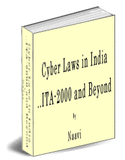The Outsourcing controversy that is threatening to slow down the growth of the
Indian IT industry is a clash of the two societies namely the Cyber Society
and the Meta Society.
A few years back when Internet was seen as a revolution that could enable any
knowledge worker reach out to the globe through a cost efficient communication
mechanism, there was a dot-com boom. While the Amazon.com and the like grew,
the threat to the Meta society where the yesteryear giants felt jolted from
their position of strength became a cause of worry to vested interests in the
Meta society. This started the first clash between the two civilizations, the
emerging civilization of Netizens of the Cyber Society and the existing
civilization of the Meta Society. The Meta society came victors in this battle
using the strategy of treating the Cyber Society merely as an extension of the
Meta Society and using the IPR stick. Soon, the Trademark laws and Copyright
laws of the Meta society became the means of establishing the meta society's
hold on the Cyber Society.
The present controversies surrounding outsourcing of contracts is
another manifestation of the clash of the two societies. It is because of the
capabilities of the Internet and the new communication technologies that
it is possible for a US citizen to be serviced by an Indian worker as if he is
sitting right in the heart of California. The instant reach of Internet
technology means that the geographical boundaries are no longer relevant and
the business can structure a solution which is most cost efficient by bringing
together the market need of USA with the manpower capabilities of India.
If US senators are thinking of pursuing a protectionist policy, they would be
supporting an inefficient system which eventually will reduce economic wealth
in the globe. This will also encourage India and other countries to protect
their manufacturing sector by preventing the entry of foreign goods into
India.
The unimaginative short term policies of US is likely to give a boost to the
Swadeshi movement in India and probably start a new demand that India should
restrict outsourcing of hardware purchase in the Indian Government sector
and introduce a legislation that in all e-Governance services, indigenous
hardware alone can be used or preferred.
Perhaps US would like to use WTO to arm twist India, but political compulsions in India would
force India to take a tough stand in this regard.
Thus it appears that the struggle to protect the vested interest of workers
physically situated in a geographical location where marketing opportunities
arise and prevent the workers of the Cyber Society to take over, could lead to
the questioning of the fundamental belief of the WTO process and bring long
lasting changes to the global economy in the coming years.
India which has a strong set of Cyber Society workers, should take the
lead in strengthening the hands of Cyber Democracy by strongly opposing
the anti-BPO movement and enable the Netizens irrespective of their
Citizenship to pursue business opportunities wherever they arise.
Naavi
March 15, 2004
